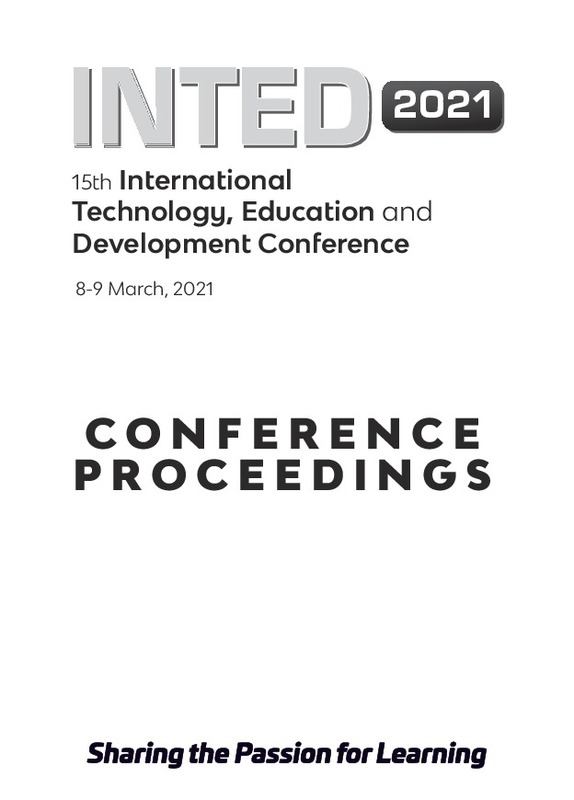JavaScript is disabled for your browser. Some features of this site may not work without it.
Buscar en RiuNet
Listar
Mi cuenta
Estadísticas
Ayuda RiuNet
Admin. UPV
Introducing flipped learning in theoretical classes of computer aided design
Mostrar el registro sencillo del ítem
Ficheros en el ítem
| dc.contributor.author | Gracia-Ibáñez, V.
|
es_ES |
| dc.contributor.author | Vergara, M.
|
es_ES |
| dc.contributor.author | Perez-Belis, Victoria
|
es_ES |
| dc.contributor.author | González-Lluch, C.
|
es_ES |
| dc.contributor.author | Bellés-Ibáñez, M.J.
|
es_ES |
| dc.date.accessioned | 2021-11-20T21:31:35Z | |
| dc.date.available | 2021-11-20T21:31:35Z | |
| dc.date.issued | 2021-03-09 | es_ES |
| dc.identifier.isbn | 978-84-09-27666-0 | es_ES |
| dc.identifier.issn | 2340-1079 | es_ES |
| dc.identifier.uri | http://hdl.handle.net/10251/177314 | |
| dc.description.abstract | [EN] The Bachelor¿s Degree in Industrial Design and Product Development Engineering at Jaume I University (UJI) in Castelló (Spain) include 3 one-semester courses of Technical Drawing and Computer Aided Design (CAD). Throughout the three subjects, students learn to create Engineering Technical Drawings according to Normative firstly through sketching in Technical Drawing and Graphics (TDG) and then with CAD applications starting with two-dimensional CAD applications to three-dimensional ones in CADI & CADII. The three subjects have been coordinated in several aspects (such as development of material to facilitate student¿s self-learning, the use of selfassessment or peer-assessment) and they share a common structure with theoretical and practical sessions, along with the development of a graphic project throughout the course. Theoretical classes have been taught in standard lecture format (teachers explaining contents), being uninteresting for students. Going further in subjects¿ coordination, the teachers of the three subjects during 2020 created a teaching innovation group to start implementing flipped classes in the theoretical sessions to driven the focus from the teacher to the students. They must learn by their own, previously to the face-to-face class by means of different material and tasks prepared by the teacher. Then, in face-to-face class, learning that is more active is carried out. They practise by doing different tasks and the real understanding of the concepts that were self-trained previously is put to the test. During the first semester of 2020, the experience was carried out in TDG in just one session, but with encouraging results, concluding that the experience should be implemented in more sessions since students significantly increased their knowledge, as well as their participation and interest. In the second semester of 2020, a similar experience has been carried out in CADI. Half of the sessions before the first midterm exam were in flipped mode, whereas the rest were taught in the traditional way. Furthermore, the theoretical exam included questions worked on the flipped classes. Students answered a questionnaire about their experience with both methodologies `traditional lecture classes¿ and `flipped classes¿. The results obtained show that students rated very similarly the attendance to traditional classes and to the flipped ones as for their utility for concepts understanding and for the exam preparation. However, while the attendance of non-repeater students was similar regardless the type of methodology, the attendance of repeater students increased in flipped classes. As for flipped classes, the material prepared for previous tasks (videos and questions) and the face-to-face tasks were highly rated. A slight preference for flipped classes was shown despite the previous tasks. When comparing both methodologies, they found the flipped classes more entertaining and useful for the better understanding than the traditional ones. Furthermore, the questions of the activities of the flipped classes introduced in the exam were percentage-wise better answered than the rest of questions. As for the exam preparation, the students rated highly to have a free online book at disposal, the weekly questionnaires that allow keeping their studies updated or the use of Socrative, regardless of the methodology used. | es_ES |
| dc.description.sponsorship | This work has been funded by the "Universitat Jaume I" through project 3809/20 within the Innovative Education Project titled: ¿Introducción de aprendizaje invertido en la enseñanza de Expresión Gráfica y Diseño Asistido por Ordenador¿ | es_ES |
| dc.language | Inglés | es_ES |
| dc.publisher | IATED Academy | es_ES |
| dc.relation.ispartof | INTED2021 Proceedings | es_ES |
| dc.rights | Reserva de todos los derechos | es_ES |
| dc.subject | Flipped classroom | es_ES |
| dc.subject | CAD | es_ES |
| dc.subject | Theoretical classes | es_ES |
| dc.subject.classification | PROYECTOS DE INGENIERIA | es_ES |
| dc.title | Introducing flipped learning in theoretical classes of computer aided design | es_ES |
| dc.type | Comunicación en congreso | es_ES |
| dc.type | Artículo | es_ES |
| dc.type | Capítulo de libro | es_ES |
| dc.identifier.doi | 10.21125/inted.2021.0567 | es_ES |
| dc.relation.projectID | info:eu-repo/grantAgreement/UJI//3809%2F20/ | es_ES |
| dc.rights.accessRights | Abierto | es_ES |
| dc.contributor.affiliation | Universitat Politècnica de València. Departamento de Proyectos de Ingeniería - Departament de Projectes d'Enginyeria | es_ES |
| dc.description.bibliographicCitation | Gracia-Ibáñez, V.; Vergara, M.; Perez-Belis, V.; González-Lluch, C.; Bellés-Ibáñez, M. (2021). Introducing flipped learning in theoretical classes of computer aided design. IATED Academy. 2664-2672. https://doi.org/10.21125/inted.2021.0567 | es_ES |
| dc.description.accrualMethod | S | es_ES |
| dc.relation.conferencename | 15th International Technology, Education and Development Conference (INTED2021) | es_ES |
| dc.relation.conferencedate | Marzo 08-09,2021 | es_ES |
| dc.relation.conferenceplace | Online | es_ES |
| dc.relation.publisherversion | https://doi.org/10.21125/inted.2021.0567 | es_ES |
| dc.description.upvformatpinicio | 2664 | es_ES |
| dc.description.upvformatpfin | 2672 | es_ES |
| dc.type.version | info:eu-repo/semantics/publishedVersion | es_ES |
| dc.relation.pasarela | S\449471 | es_ES |
| dc.contributor.funder | Universitat Jaume I | es_ES |








